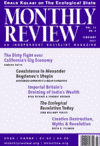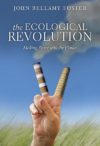2021

The Development of Productive Forces in Contemporary Capitalism
Capitalist modernity not only contains profound contradictions, but is also undergoing a significant transformation. Far from acting as a driving force for the development of social productive forces, it has become a parasitic entity with an essentially rentier and speculative function. Underlying this is an institutional framework that favors the private appropriation and the concentration of the products of general intellect. | more…

Encountering Marx and Joyce
“In the mid-1990s, when I lived in central London, I used to walk past the British Museum nearly every day. More often than not, I would pop in, did so for years, getting thrilled by a couple of things. The first was entering the great Reading Room, for which I had a Reader’s Card, glimpsing and even sitting in space G-7. I never ordered any books, had no need to order anything; all I wanted was to sit there, in Karl Marx’s seat, and try to feel the vibe. Usually, there was no vibe, only the hushed shuffling and page turning of others close by, mixed with the odd cough and splutter.” | more…

An Exchange from 2002–03
In December 2002, Isabel Crook, a Canadian anthropologist who had spent most of her life in China and a longtime friend and supporter of Monthly Review, wrote a letter to the MR editors questioning the critical nature of coverage of China’s capitalist road to socialism since the ascendance of Deng Xiaoping in the late 1970s. This short exchange with Harry Magdoff reflects the complex ways in which dedicated socialists sought to address changes in China and the clarity of the ideas expressed. | more…

Álvaro Cunhal's Five Days, Five Nights
A prolific political writer, Álvaro Cunhal—leader of Portugal’s Communist Party for half a century and central figure of the 1974 Carnation Revolution—revealed in 1994 that he had also written several novels under the pseudonym Manuel Tiago. One of these novels, Five Days, Five Nights, was only translated into and published in English in 2020. The novella manages to capture the complexities, loneliness, and bravery of ordinary people, highlighting how we are the ones who keep us safe. | more…

We remember our good friend and comrade, Leo Panitch, one of the great socialist intellectuals of all time, who died on December 19, 2020, age 75. | more…

Colonialism before the First World War
The Western European powers appropriated economic surplus from their colonies, materially and substantially aiding their own industrial transition from the eighteenth century onward, as well as the diffusion of capitalism to the regions of new European settlement. In the case of India, the concept of drain is based on the fact that a substantial part of its earnings was never permitted to accrue to the country; it was instead appropriated by the ruling power: Britain. | more…

Although natural constraints on supply are important, most economic scarcities that rule our lives are actually social and artificial. Supply and demand are not natural forces drifting through the air; they are contrived realities established by an interactive social environment involving governments, corporations, institutions, and classes. Supply and demand cycles are social constructs designed to answer a basic question: Who gets what? | more…

The Dirty Fight for Prop 22 and the Gig Economy
On California’s November 2020 ballot were some contentious and important issues, including Proposition 22, classifying rideshare drivers and app-based delivery workers as independent contractors. Gig economy giants Uber, Lyft, Doordash, and others spent a whopping $111 million on Prop 22. Of course, the companies had a lot to lose. If they were made to treat their drivers or delivery people as employees and compensate them accordingly, they would be bankrupted, they claimed. | more…

Coexistence in Alexander Bogdanov's Utopia
Alexander Bogdanov’s Red Star, published in 1908, was an attempt to reenergize the dejected revolutionaries whose efforts had been crushed during the 1905 Russian Revolution. The protagonist, Leonid, is a Russian revolutionary chosen, in the midst of the revolution, by the Martian expedition to visit their planet and learn about the centuries-old advanced form of communism there. Since the triumph of communism in Russia was the cause to which Leonid had decided to devote his life, he agrees to visit Mars so that he can absorb their ideas and principles. | more…

The Ecological Revolution was first published a little more than ten years ago in April 2009, at a time when climate change had already been recognized as a pressing global issue for over two decades, but when there was still hardly any realistic discussion of its connection to capitalism or of the immense ecological and social revolution that would be required to overcome the Earth System crisis. Let us look back to understand the historical gulf separating that time from our own. | more…

It is a testament to the clarity and scope of Mark Jay and Philip Conklin’s vision that A People’s History of Detroit is replete with insights for those trying to make sense of these deeply uncertain and troubling times. In it, Jay and Conklin show that “in order to give a true ‘people’s history,’ one must do more than condemn the malevolence of those in power and celebrate the activists who have struggled for justice; one must also come to terms with the social system in which these people lived. In our case, this means confronting the logic of capital.” | more…

We are extremely pleased to announce that John Bellamy Foster, editor of Monthly Review, has won the prestigious Deutscher Memorial Prize for 2020 for his The Return of Nature: Socialism and Ecology. | more…

Financialized Capitalism, COVID-19, and the Great Divide
Although the current crisis of production associated with the COVID-19 pandemic has sharpened disparities, the overall problem is much longer and more deep-seated, a manifestation of the inner contradictions of monopoly-finance capital. Comprehending the basic parameters of today’s financialized capitalist system is the key to understanding the contemporary contagion of capital, a corrupting and corrosive cash nexus that is spreading to all corners of the U.S. economy, the globe, and every aspect of human existence. | more…












